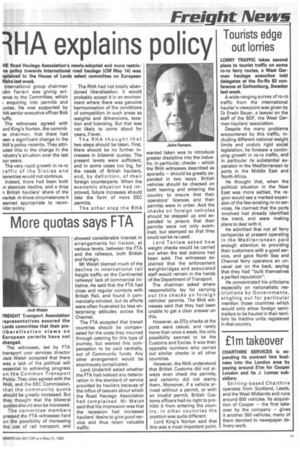More quotas says FTA
Page 13

If you've noticed an error in this article please click here to report it so we can fix it.
FREIGHT Transport Association representatives assured the Lords committee that their proliberalisation views on European permits have not changed.
The witnesses, led by FTA transport user services director Jack Welsh accepted that there was a lack of the political will essential to achieving progress on the Common Transport Policy. They also agreed with the RHA, and the EEC Commission, that the community quota should be greatly increased. But they thought that the bilateral quotas should also be increased.
The committee members pressed the FTA witnesses hard on the possibility of increasing the use of rail transport, and showed considerable interest in arrangements for liaison, at various levels, between the FTA and the railways, both British and foreign.
Mr Welsh blamed much of the decline in international rail freight traffic on the Continental railways' lack of commercial initiative. He said that the FTA had close and regular contacts with British Rail, and found it commercially-minded, but its efforts were often frustrated by less enterprising attitudes across the Channel.
The FTA accepted that transit countries should be compensated for the costs they incurred through catering for this type of journey, but wanted this compensation to be paid centrally, out of Community funds. Any other arrangement would be enormously complicated.
Lord Underhill asked whether the FTA had noticed any deterioration in the standard of service provided by hauliers because of the influx of casuals about which the Road Haulage Association had complained. Mr Welsh said that his impression was that the recession had increased hauliers' desire to give good service and thus retain valuable traffic.
























































































































